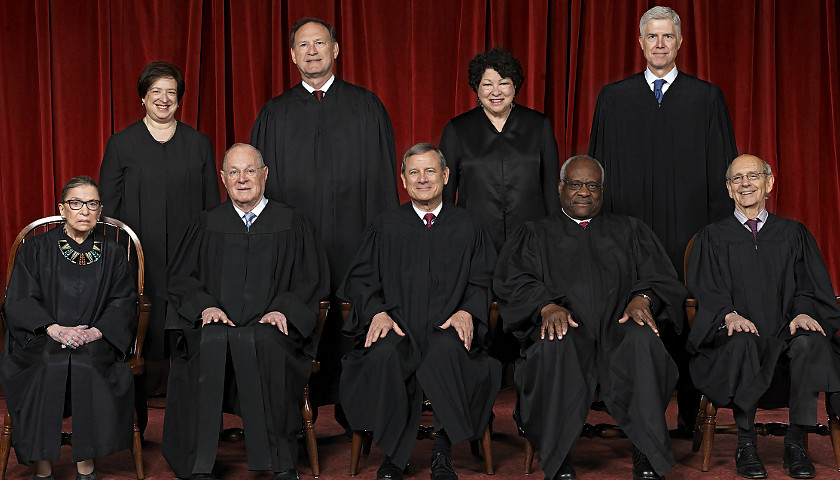by Kevin Daley
As the U.S. Supreme Court approaches the conclusion of its 2017 – 2018 term, the justices are expected to release a deluge of decisions in the coming weeks, including marquee opinions addressing mandatory union dues, partisan gerrymandering, and President Donald Trump’s travel ban.
As of this writing, there are 25 decisions outstanding.
Among the remaining cases is one of the first argued this term, a partisan gerrymandering dispute arising from Wisconsin called Gill v. Whitford. It’s Maryland counterpart, Benisek v. Lamone, is also pending. Both cases ask the justices to declare politically-motivated line-drawing during the 10-year redistricting process unconstitutional. Gill involves a challenge to the entirety of Wisconsin’s state legislative district map, arguing it violates the Constitution’s First Amendment and its equal protection guarantees. The Benisek plaintiffs are challenging the boundaries of a single congressional district and make a slightly different First Amendment argument.
The justices heard the Gill case in October and Benisek in March. During the Benisek argument, Justice Stephen Breyer suggested the Court package three pending partisan gerrymandering cases together and set them for re-argument next term. The request has lead some observers to speculate that the tribunal is deeply divided as to the resolution of these disputes.
The Court will also pronounce upon the constitutionality of compulsory public section union dues, known as fair-share fees, in Janus v. AFSCME. Under this arrangement, labor bosses may collect fees from non-unionized government workers to defray the costs of collective bargaining. Though fair-share fees may not be used for political purposes, critics of the regime say workers are still forced to subsidize political activity, since most union business — especially collective bargaining — is deeply political.
For their part, organized labor warns that mandatory dues are essential for labor peace. During the March Janus arguments, the attorney representing the American Federation of State, Country, and Municipal Employees warned that the end of the fair-share arrangement could precipitate widespread worker unrest of the sort the country has not seen in decades.
Compulsory fees seemed imperiled in a 2016 case arising from California, but Justice Antonin Scalia’s unexpected death left a short-handed panel unable to resolve the controversy. After Justice Neil Gorsuch’s confirmation, the Court agreed to hear the Janus dispute, which presents the same question as the 2016 case.
Trump’s travel ban also awaits judgement. A coalition of Democratic states and civil rights groups are challenging the latest iteration of the sanctions, which impose entrance penalties to varying degrees on nationals from Iran, Libya, North Korea, Somalia, Syria, Venezuela, and Yemen.
Though the administration says the sanctions are essential to national security, the plaintiffs charge that they reflect Trump’s anti-Muslim animus in violation of the Constitution’s ban on religious favoritism and exceed his authority under federal immigration law.
Once the Court adjourns in late June, it will not resume hearing cases until October. Depending on the pace at which opinions are released, the current term may extend into July, though the Court has not overrun the June deadline in two decades.
– – –
Kevin Daley is a reporter at Daily Caller News Foundation. Follow Kevin on Twitter.




